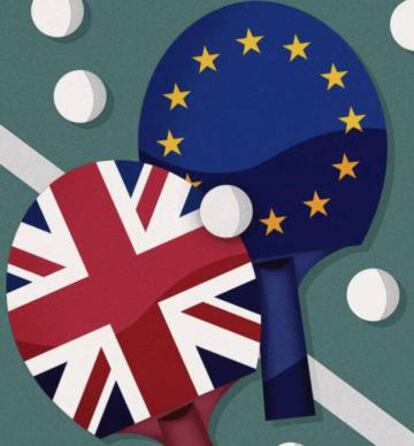Prepared for Brexit
“The main priority of the Spanish government has always been to offer certainty and security during this process,” writes Spanish Prime Minister Pedro Sánchez

The British parliament has decided to reject the ratification of the Withdrawal Agreement that was reached between the heads of state and government of the European Union and the government of the United Kingdom. This step was taken despite the added guarantees offered with great effort by the EU. I deeply lament this decision, which means prolonging the situation of uncertainty when there are little over two weeks to go before the date when Brexit should theoretically materialize. There are many lessons to be learned from a process that is keeping the British people trapped in a veritable blind alley.
It is impossible to understand Brexit without considering the combination of three elements: a nationalism that supports turning inwards on the strength of national myths and false nostalgia; the advance of the far right; and the simplification of the concept of democracy, where referendums are used as tools offering simple answers to complex problems.
There are many lessons to be learned from a process that is keeping the British people trapped in a veritable blind alley
The years prior to the Brexit referendum of June 2016 were marked by the rise of the UK Independence Party (UKIP), a political force that made leaving the European Union the centerpiece of its existence. To make its message take hold in British society, this party consistently demonized the EU and consciously disregarded the real needs of citizens. The one and only goal was to ensure that leaving the EU would monopolize the political agenda.
We watched a trend emerge that this continent has already witnessed in the past: a minority sector with extreme views imposing its ideas by conditioning other political actors. Actors who sacrifice pragmatism, with devastating results.
The referendum was held, and we all know what the outcome was.
The decision-taking method is not entirely alien to the circumstances in which we find ourselves today: a simple yes/no answer to complex questions with far-reaching consequences. A binary decision mechanism with mutually exclusive alternatives that denied the wealth of nuance that defines democracy. That is the vision of democracy that deserves to be preserved in Europe.
The campaign was rife with all kinds of exaggerations and lies. It was said that there would be additional resources for the National Health Service; that access to the single market would be preserved; and that dozens of trade agreements would be instantly signed.

The top priority for the Spanish government has always been the same: offering rigor, certainty and security in this process – especially for citizens and economic players – while reinforcing the foundations of the future relationship with a country with which we have deep and varied ties.
On a day such as today, the important thing is that Spain has done its homework. Spaniards are ready for any scenario, deal or no deal.
In order to manage the UK’s withdrawal with a degree of certainty, and once I had verified the guarantees regarding Gibraltar that Spain needed, in November of last year I and other heads of state and government endorsed the Withdrawal Agreement and approved the Political Declaration on the future relationship.
This agreement affords peace of mind and security for citizens who have made vital decisions based on the UK’s decades-long membership of the EU; it preserves their rights and guarantees that the UK will honor the financial commitments it acquired while it was a member of the EU.
It also includes a transition period to allow for a progressive adaptation to the new circumstances, and to advance in talks about the future relationship between the EU and the UK.
The agreement furthermore guarantees that the border between the Republic of Ireland and Northern Ireland will remain invisible, thus preserving the peace and the spirit of the Good Friday Agreement. By the way, there are not many better examples than this one to clearly illustrate the key role played by Europe to heal wounds that had been festering for generations around forgotten borders – the kinds of borders that some are so anxious to raise once more.
The important thing is that Spain has done its homework. Spaniards are ready for any scenario, deal or no deal
The Agreement offers all possible guarantees, certainty and security for an orderly withdrawal. And it is complemented by a Political Declaration that points the way toward a mutually beneficial future relationship.
The European Council and the European Commission also adopted a joint statement that, for the first time in history, recognized a determining role for Spain, including a veto right over the future relationship between Gibraltar and the European Union. These guarantees have been reinforced by including a clarification about the territorial scope of Article 184 of the Withdrawal Agreement in the new joint instrument. Thanks to this, we are in a privileged position to build a future of shared prosperity between neighboring Campo de Gibraltar and Gibraltar in the coming decades.
To reach this agreement, the 27 member states made huge efforts to be flexible. Unfortunately, when the most immovable kind of nationalism is monopolizing the debate, any concession or agreement is interpreted as a betrayal.
In January, the British parliament found itself facing the dilemmas posed by the destruction of a framework of political, legal and economic relationships that have spanned more than 45 years. It was the logical culmination of a process that had been contaminated by the simplistic rhetoric that had emerged from a divisive tool such as a referendum.
British members of parliament neither ratified the Withdrawal Agreement, nor could they reach a basic consensus on the existing real possibilities: leaving with no deal, a negotiated deal, or staying within the European Union. The decision taken via the referendum has been followed by complete political deadlock.
Whatever happens next, the EU should continue with its process of integration
Whatever the case, given the possibility of a no-deal Brexit, I would like to convey a message of calm. On March 1, the Spanish government approved a royal decree with contingency measures that will cover all aspects linked to the UK’s withdrawal. It has also taken logistical measures, with the approval of new public positions in the sectors that will be most affected, such as customs.
The European Commission, for its part, has adopted the necessary measures in the areas that are under its remit.
After its withdrawal, the United Kingdom will not be a part of the European Union, but it will still be a part of Europe. It will continue to be a very important partner, especially for Spain, which has the highest number of British residents and tourists in the EU.
The measures that we have adopted will protect the rights of British citizens who are resident in Spain, and the British government has announced that it will do the same for Spanish residents there.
Our bilateral relations are, and will continue to be, excellent, and the United Kingdom can continue to count on Spain as a partner and ally. With regard to the future relationship, I want to maintain the greatest mobility for our citizens and connectivity between our two countries, as well as the closest cooperation possible in the areas of security, the fight against organized crime and terrorism.
Whatever happens next, the EU should continue with its process of integration. The next European elections will be a decisive moment. There are two clearly defined options ahead.
One is a callback to the past, to the rejection of diversity and to fears of the future. The other option is represented by decidedly pro-European political forces, who are banking on reason and common sense, via pacts and a spirit of consensus. This is the time to take a step forward for that kind of Europe. It is time to protect Europe if we want Europe to protect us.
Next Thursday, at the European Council, I will continue to work to guarantee the security and certainty of Spaniards and Europeans; for the ongoing existence of a unique framework across the world, one that requires a commitment by pro-European governments in order to keep advancing. In defense of the European model, the only one that has been able to bring together economic development and the predominance of rights, freedoms and values – all of which are worth the continued fight for.
Pedro Sánchez is the Prime Minister of Spain.
English version by Susana Urra and Simon Hunter.
Tu suscripción se está usando en otro dispositivo
¿Quieres añadir otro usuario a tu suscripción?
Si continúas leyendo en este dispositivo, no se podrá leer en el otro.
FlechaTu suscripción se está usando en otro dispositivo y solo puedes acceder a EL PAÍS desde un dispositivo a la vez.
Si quieres compartir tu cuenta, cambia tu suscripción a la modalidad Premium, así podrás añadir otro usuario. Cada uno accederá con su propia cuenta de email, lo que os permitirá personalizar vuestra experiencia en EL PAÍS.
¿Tienes una suscripción de empresa? Accede aquí para contratar más cuentas.
En el caso de no saber quién está usando tu cuenta, te recomendamos cambiar tu contraseña aquí.
Si decides continuar compartiendo tu cuenta, este mensaje se mostrará en tu dispositivo y en el de la otra persona que está usando tu cuenta de forma indefinida, afectando a tu experiencia de lectura. Puedes consultar aquí los términos y condiciones de la suscripción digital.









































